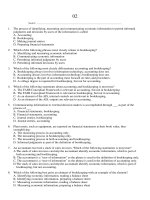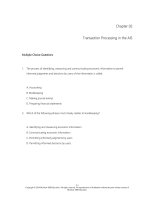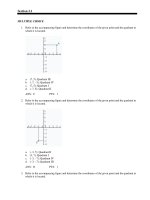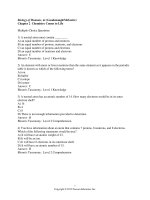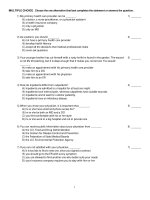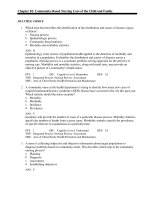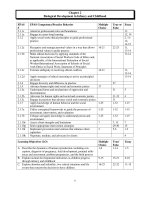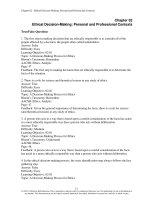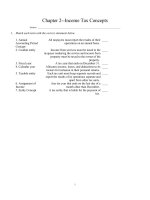Economics of social issues 20th edition sharp test bank
Bạn đang xem bản rút gọn của tài liệu. Xem và tải ngay bản đầy đủ của tài liệu tại đây (396.48 KB, 26 trang )
Chapter 02 - Economic Systems, Resource Allocation, and Social Well-Being: Lessons from China's Transition
Chapter 02
Economic Systems, Resource Allocation, and Social Well-Being: Lessons
from China's Transition
Multiple Choice Questions
1. Which of the following descriptions fits the American economy best?
a. A pure market economy
B. A mixed economy
c. Purely competitive economy
d. A command economy
e. A monopoly economy
2. In a market economy,
A. Resources are allocated by the private parties who own the resources
b. Resources are allocated by the various local, state, and federal planning committees and
zoning commissions
c. Shortages never exist
d. Surpluses never exist
e. Both c) and d)
3. In 1978, the Chinese economy
A. Opened ties to the noncommunist world
b. Became a strictly centralized economy under Joseph Stalin
c. Became communist under Mao Zedong
d. Moved to the island of Taiwan
e. Became a purely market-oriented economy
4. In both the U.S. and Canada, most, but not all, of economic resources are owned and
controlled by private parties who make decisions as to how to use those resources with
somewhat limited interference from government. As such, these economies are examples of
a. The pure command economy
B. Mixed economies, though closer to the market end of the spectrum
c. Mixed economies, though closer to the command end of the spectrum
d. The pure market economy
e. The communist economy
2-1
© 2013 by McGraw-Hill Education. This is proprietary material solely for authorized instructor use. Not authorized for sale or distribution in
any manner. This document may not be copied, scanned, duplicated, forwarded, distributed, or posted on a website, in whole or part.
Chapter 02 - Economic Systems, Resource Allocation, and Social Well-Being: Lessons from China's Transition
5. In the market economy, markets serve the function of
a. Coordinating resource use decisions made by individual owners of resources
b. Bringing about resource allocation changes desired by resource owners
c. Determining prices
D. All of the above
e. Both (a) and (b)
6. Which of the following is least consistent with the pure market economy?
a. An established legal system that arbitrates contract disputes
b. An individual accepting a job for $1 per hour
c. The institution of private property rights
D. The existence of a minimum wage
e. Private property rights
7. Which of the following is not a characteristic of a purely competitive market?
a. Enough sellers and buyers so that no one of them acting alone can influence the price of
this product
B. The ability of a single seller to block potential competitors out of the market
c. Freedom of the price to move up or down, that is, no price fixing
d. Mobility of buyers and sellers
e. A standardized product
8. A market with only one seller of a product that has no good substitutes is called
A. A pure monopoly
b. A pure command economy
c. Purely competitive
d. Imperfectly competitive
e. An oligopoly
9. Which of the following is true of monopoly firms? They
A. Can manipulate the price of their product
b. Beat their competitors' prices
c. Must constantly deal with the entry of new firms
d. Never receive government help blocking entry into the market
e. Do all of the above
2-2
© 2013 by McGraw-Hill Education. This is proprietary material solely for authorized instructor use. Not authorized for sale or distribution in
any manner. This document may not be copied, scanned, duplicated, forwarded, distributed, or posted on a website, in whole or part.
Chapter 02 - Economic Systems, Resource Allocation, and Social Well-Being: Lessons from China's Transition
10. Markets that fall between pure competition and monopoly are called:
a. Anti-competitive
B. Imperfectly competitive
c. Command markets
d. Tweener markets
e. Monopsonistic
11. If a consumer always eats cheese with macaroni, then for that consumer macaroni and
cheese are examples of:
a. Substitutes
B. Complements
c. Normal goods
d. Inferior goods
e. Standardized products
12. If an increase in the price of cookies leads to a decrease in the demand for ice cream, then
ice cream and cookies must be
a. Substitutes
B. Complements
c. Normal goods
d. Inferior goods
e. Standardized products
13. If an increase in the price of bicycles leads to an increase in the demand for bus
transportation, the bicycles and bus rides must be
A. Substitutes
b. Complements
c. Normal goods
d. Inferior goods
e. Standardized products
2-3
© 2013 by McGraw-Hill Education. This is proprietary material solely for authorized instructor use. Not authorized for sale or distribution in
any manner. This document may not be copied, scanned, duplicated, forwarded, distributed, or posted on a website, in whole or part.
Chapter 02 - Economic Systems, Resource Allocation, and Social Well-Being: Lessons from China's Transition
14. A student graduates from college and gets a high-paying job. As a result of the increase in
income, the student buys more frozen pizzas. For the student, frozen pizzas must be a(n)
a. Substitute
b. Complement
C. Normal good
d. Inferior good
e. Standardized product
15. You receive a big raise at work. As a result of your now higher income, you stop bringing
your lunch from home and start eating lunch at a nearby restaurant. Your homemade lunches
must be
a. A substitute
b. A complement
c. Normal goods
D. Inferior goods
e. Standardized products
16. The Law of Demand states that price and
a. Demand are positively related
b. Quantity demanded are positively related
c. Demand are negatively related
D. Quantity demanded are negatively related
e. None of the above
17. The Law of Supply states that price and
a. Supply are positively related
B. Quantity supplied are positively related
c. Supply are negatively related
d. Quantity supplied are negatively related
e. Quantity demanded are negatively related
2-4
© 2013 by McGraw-Hill Education. This is proprietary material solely for authorized instructor use. Not authorized for sale or distribution in
any manner. This document may not be copied, scanned, duplicated, forwarded, distributed, or posted on a website, in whole or part.
Chapter 02 - Economic Systems, Resource Allocation, and Social Well-Being: Lessons from China's Transition
18. An increase in the price of a good will cause which of the following?
a. Quantity demanded to demand to rise
b. Demand to fall
c. Quantity supplied to fall
d. Supply to rise
E. None of the above
19. Which of the following will cause demand to rise?
a. A decrease in price
b. A decrease in the price of a substitute good
C. A decrease in the price of a complementary good
d. An increase in supply
e. An increase in the cost of production
20. Given a downward-sloping demand curve and an upward-sloping supply curve, an
increase in supply together with an increase in demand will cause the
A. Equilibrium quantity purchased to increase, but the effect on price will be indeterminate
b. Equilibrium quantity purchased to decrease, but the effect on price will be indeterminate
c. Price to rise, but the effect on the equilibrium quantity purchased will be indeterminate
d. Price to fall, but the effect on the quantity bought and sold will be indeterminate
e. Equilibrium price to rise and the equilibrium quantity purchased will rise
21. A situation in which the demand for a product is decreasing while the price is
simultaneously increasing can be explained by
A. A decrease in supply
b. An increase in supply
c. Unchanged supply
d. All of the above
e. None of the above
2-5
© 2013 by McGraw-Hill Education. This is proprietary material solely for authorized instructor use. Not authorized for sale or distribution in
any manner. This document may not be copied, scanned, duplicated, forwarded, distributed, or posted on a website, in whole or part.
Chapter 02 - Economic Systems, Resource Allocation, and Social Well-Being: Lessons from China's Transition
Questions 22 - 24 refer to the graph below.
22. At price P1 there is a
A. Surplus of X1X2
b. Shortage of X1X2
c. Surplus of XX2
d. Surplus of AB
e. Shortage of X1X
23. At a price of P1, what quantity will be sold in the market?
a. 0
b. X
C. X1
d. X2
e. X1X2
24. If the market is in equilibrium, the price and quantity will be
a. P1 and X1
b. P and X1
c. P1 and X
D. P and X
e. P and X2
2-6
© 2013 by McGraw-Hill Education. This is proprietary material solely for authorized instructor use. Not authorized for sale or distribution in
any manner. This document may not be copied, scanned, duplicated, forwarded, distributed, or posted on a website, in whole or part.
Chapter 02 - Economic Systems, Resource Allocation, and Social Well-Being: Lessons from China's Transition
Questions 25 - 30 refer to the graph below.
25. The demand curve and supply curve for beef are DD and SS. The demand curve shifts to
D1D1 and a price ceiling is placed on beef at price p. The result will be
a. A surplus equal to X1X
b. A shift in the supply curve to S1S1
c. An increase in the quantity placed on the market to X1
d. Both (b) and (c) above
E. A shortage equal to X1X
26. The demand curve and supply curve for beef are DD and SS. Which of the following
could NOT cause demand to shift to D1D1?
a. An increase in the price of a substitute good
B. An increase in the price of a complementary good
c. An increase in consumer income
d. A change in consumer tastes
e. A change in consumer expectations
2-7
© 2013 by McGraw-Hill Education. This is proprietary material solely for authorized instructor use. Not authorized for sale or distribution in
any manner. This document may not be copied, scanned, duplicated, forwarded, distributed, or posted on a website, in whole or part.
Chapter 02 - Economic Systems, Resource Allocation, and Social Well-Being: Lessons from China's Transition
27. The demand curve and supply curve for beef are DD and SS. Which of the following
could cause supply to shift to S1S1?
a. An increase in the cost of production
B. A decrease in the cost of production
c. An increase in the price of a substitute in production
d. An increase in income
e. All of the above
28. Which of the following statements is incorrect?
a. If supply decreases and demand remains constant, equilibrium price will rise
B. If demand decreases and supply increases, equilibrium price will rise
c. If supply increases and demand decreases, equilibrium price will fall
d. If demand increases and supply decreases, equilibrium price will rise
e. If supply is constant and demand increases, price will rise
29. If demand and supply shift to D1D1 and S1S1, market price will be
A. P
b. Above P
c. Below P
d. Indeterminate
e. The price that goes with the quantity X
30. Which of the following will cause a change in the demand for beer?
A. A change in the average income in the economy
b. A change in the price of hops (used to make beer)
c. A change in the price of beer
d. All of the above
e. None of the above
2-8
© 2013 by McGraw-Hill Education. This is proprietary material solely for authorized instructor use. Not authorized for sale or distribution in
any manner. This document may not be copied, scanned, duplicated, forwarded, distributed, or posted on a website, in whole or part.
Chapter 02 - Economic Systems, Resource Allocation, and Social Well-Being: Lessons from China's Transition
31. The Law of Demand suggests that
a. Higher prices automatically result in higher profits
b. Demand determines supply
C. The lower the price of a product, the more consumers will wish to purchase, other things
equal
d. Without laws, markets would not reach equilibrium
e. Both (a) and (c)
32. A change in the quantity supplied of a good may be caused by
a. A change in technology
b. A change in the number of firms selling the good
c. A change in the price of the good
d. A change in the demand for the good
E. Either (c) or (d)
Questions 33 - 37 refer to the graph below.
2-9
© 2013 by McGraw-Hill Education. This is proprietary material solely for authorized instructor use. Not authorized for sale or distribution in
any manner. This document may not be copied, scanned, duplicated, forwarded, distributed, or posted on a website, in whole or part.
Chapter 02 - Economic Systems, Resource Allocation, and Social Well-Being: Lessons from China's Transition
33. Equilibrium price and quantity are
a. 20 and 100
b. 20 and 200
c. 15 and 300
D. 15 and 200
e. 10 and 200
34. A price of $10 will lead to a
A. Shortage of 200
b. Surplus of 200
c. Shortage of 100
d. Surplus of 100
e. Surplus of 300
35. A price of $20 will lead to a
a. Shortage of 200
B. Surplus of 200
c. Shortage of 100
d. Surplus of 100
e. Surplus of 300
36. When price is $10, how much will be sold in the market?
a. 0
B. 100
c. 200
d. 300
e. It can not be determined
37. Which of the following could lead to a price of $20 in the market?
a. An increase in demand
B. A decrease in supply
c. A decrease in demand
d. An increase in supply
e. An increase in both supply and demand
2-10
© 2013 by McGraw-Hill Education. This is proprietary material solely for authorized instructor use. Not authorized for sale or distribution in
any manner. This document may not be copied, scanned, duplicated, forwarded, distributed, or posted on a website, in whole or part.
Chapter 02 - Economic Systems, Resource Allocation, and Social Well-Being: Lessons from China's Transition
Questions 38 - 43 refer to the graph below.
38. If the market starts in equilibrium with D1 and S1, price and quantity are
a. 13 and 55
b. 10 and 40
c. 10 and 65
D. 7 and 55
e. 10 and 55
39. If the market starts in equilibrium with D1 and S1, and the price of Pepsi increases, the
new equilibrium price and quantity are
a. 13 and 55
b. 10 and 40
C. 10 and 65
d. 7 and 55
e. 10 and 55
40. If the market starts in equilibrium with D1 and S1, and the price of carbonated water (the
main ingredient in Dr. Pepper) increases, the new equilibrium price and quantity are
a. 13 and 55
B. 10 and 40
c. 10 and 65
d. 7 and 55
e. 10 and 55
2-11
© 2013 by McGraw-Hill Education. This is proprietary material solely for authorized instructor use. Not authorized for sale or distribution in
any manner. This document may not be copied, scanned, duplicated, forwarded, distributed, or posted on a website, in whole or part.
Chapter 02 - Economic Systems, Resource Allocation, and Social Well-Being: Lessons from China's Transition
41. If the market starts in equilibrium with D1 and S1, and more consumers develop a
preference for Dr. Pepper, the new equilibrium price and quantity are
a. 13 and 55
b. 10 and 40
C. 10 and 65
d. 7 and 55
e. 10 and 55
42. If the market starts in equilibrium with D1 and S1, and equilibrium price and quantity
increase to $10 and 65, which of the following could have caused the change?
A. An increase in consumer income
b. An increase in production costs
c. The discovery that Dr. Pepper causes health problems
d. A technological advance in Dr. Pepper production
e. All of the above
43. Which of the following is NOT one of the "other things equal" underlying the demand
curve?
A. Prices of resources
b. Purchasing power of buyers
c. Buyers' tastes and preferences
d. Numbers of buyers
e. Buyers' expectations
44. A change in the quantity demanded
a. Results whenever one of the "other things equal" underlying the demand curve changes
b. Results when the price of the product increases or decreases
c. Means a shift in the position of the demand curve
d. Means movement along a given demand curve
E. Is both (b) and (d)
2-12
© 2013 by McGraw-Hill Education. This is proprietary material solely for authorized instructor use. Not authorized for sale or distribution in
any manner. This document may not be copied, scanned, duplicated, forwarded, distributed, or posted on a website, in whole or part.
Chapter 02 - Economic Systems, Resource Allocation, and Social Well-Being: Lessons from China's Transition
45. Suppose that all workers receive a wage reduction. What would the impact on the market
for autos be?
a. The supply of autos would decrease
b. The demand for autos would increase
C. The supply of autos would increase and the demand for autos would fall
d. Both a) and b)
e. It can not be determined
46. There is an increase in the quantity of pizza purchased but no change in the price of pizza.
Which of the following is most likely to have occurred?
a. Supply increased while demand remained unchanged
B. Both supply and demand increased
c. Supply increased while the quantity demanded increased
d. Demand increased while supply remained unchanged
e. Both supply and demand decreased
47. Two goods are said to be substitutes in consumption if
a. An increase in the price of one leads to a fall in the demand for the other
B. An increase in the price of one leads to an increase in the demand for the other
c. An increase in the price of one leads to an increase in the supply of the other
d. A fall in the price of one leads to an increase in the demand for the other
e. A decrease in the price of one leads to a decrease in the supply of the other
48. Assume lettuce and salad dressing are complements in consumption. An increase in the
price of lettuce will
A. Lead to a fall in the demand for salad dressing
b. Lead to a fall in the quantity demanded of salad dressing
c. Have no impact on the demand for salad dressing
d. Lead to a fall in the supply of salad dressing
e. Lead to a rise in the supply of salad dressing
2-13
© 2013 by McGraw-Hill Education. This is proprietary material solely for authorized instructor use. Not authorized for sale or distribution in
any manner. This document may not be copied, scanned, duplicated, forwarded, distributed, or posted on a website, in whole or part.
Chapter 02 - Economic Systems, Resource Allocation, and Social Well-Being: Lessons from China's Transition
49. Which of the following is true for inferior goods?
a. The law of demand does not hold
b. They are of low quality
C. The demand for them falls as consumer income rises
d. All of the above
e. None of the above
50. An increase in the wages of orange pickers will have what effect in the market for
oranges?
A. Price will increase, quantity will decrease
b. Price will increase, quantity will increase
c. Price will decrease, quantity will decrease
d. Price will decrease, quantity will increase
e. The new equilibrium price and quantity can not be determined
51. An increase in consumer income will have what effect on the equilibrium price and
quantity of hot dogs?
a. Price will increase, quantity will decrease
b. Price will increase, quantity will increase
c. Price will decrease, quantity will decrease
d. Price will decrease, quantity will increase
E. The new equilibrium price and quantity can not be determined
52. An increase in the price of cars will have what effect on the equilibrium price and quantity
of gasoline?
a. Price will increase, quantity will decrease
b. Price will increase, quantity will increase
C. Price will decrease, quantity will decrease
d. Price will decrease, quantity will increase
e. The new equilibrium price and quantity can not be determined
2-14
© 2013 by McGraw-Hill Education. This is proprietary material solely for authorized instructor use. Not authorized for sale or distribution in
any manner. This document may not be copied, scanned, duplicated, forwarded, distributed, or posted on a website, in whole or part.
Chapter 02 - Economic Systems, Resource Allocation, and Social Well-Being: Lessons from China's Transition
53. A technological advance in the production of computers will have what effect on the
equilibrium price and quantity in the computer market?
a. Price will increase, quantity will decrease
b. Price will increase, quantity will increase
c. Price will decrease, quantity will decrease
D. Price will decrease, quantity will increase
e. The new equilibrium price and quantity can not be determined
54. A publicized report that finds orange juice prevents certain diseases will have what effect
on the equilibrium price and quantity of orange juice?
a. Price will increase, quantity will decrease
B. Price will increase, quantity will increase
c. Price will decrease, quantity will decrease
d. Price will decrease, quantity will increase
e. The new equilibrium price and quantity can not be determined
55. As the baby boom generation continues to age, what will happen to the equilibrium price
and quantity of homes in retirement communities?
a. Price will increase, quantity will decrease
B. Price will increase, quantity will increase
c. Price will decrease, quantity will decrease
d. Price will decrease, quantity will increase
e. The new equilibrium price and quantity can not be determined
56. If consumers expect an increase in the price of coffee next month, what will happen to the
equilibrium price and quantity of coffee this month?
a. Price will increase, quantity will decrease
B. Price will increase, quantity will increase
c. Price will decrease, quantity will decrease
d. Price will decrease, quantity will increase
e. The new equilibrium price and quantity can not be determined
2-15
© 2013 by McGraw-Hill Education. This is proprietary material solely for authorized instructor use. Not authorized for sale or distribution in
any manner. This document may not be copied, scanned, duplicated, forwarded, distributed, or posted on a website, in whole or part.
Chapter 02 - Economic Systems, Resource Allocation, and Social Well-Being: Lessons from China's Transition
57. The entry of new firms into a market, all other things equal, will have what effect on
equilibrium price and quantity?
a. Price will increase, quantity will decrease
b. Price will increase, quantity will increase
c. Price will decrease, quantity will decrease
D. Price will decrease, quantity will increase
e. The new equilibrium price and quantity can not be determined
58. An increase in the price of flashlights will have what effect on the equilibrium price and
quantity of batteries?
a. Price will increase, quantity will decrease
b. Price will increase, quantity will increase
C. Price will decrease, quantity will decrease
d. Price will decrease, quantity will increase
e. The new equilibrium price and quantity can not be determined
59. If the price of film increases at the same time the cost of camera production increases,
what will happen to the equilibrium price and quantity in the camera market?
a. Price will increase, quantity will decrease
b. Price will increase, quantity will increase
c. Price will decrease, quantity will decrease
d. Price will decrease, quantity will increase
E. The new equilibrium price and quantity can not be determined
60. If there is a technological advance in the production of paper at the same time consumer
income increases (assume paper is a normal good), what will happen in the market for paper?
a. Price will increase, quantity will decrease
b. Price will increase, quantity will increase
c. Price will decrease, quantity will decrease
d. Price will decrease, quantity will increase
E. The new equilibrium price and quantity can not be determined
2-16
© 2013 by McGraw-Hill Education. This is proprietary material solely for authorized instructor use. Not authorized for sale or distribution in
any manner. This document may not be copied, scanned, duplicated, forwarded, distributed, or posted on a website, in whole or part.
Chapter 02 - Economic Systems, Resource Allocation, and Social Well-Being: Lessons from China's Transition
61. Suppose the United Auto Workers union successfully lobbies Congress to enact an import
quota on all foreign cars imported into the U.S. Which of the following is most likely to occur
in the U.S.?
a. A fall in the price of imported cars and increase in the price of domestics
B. An increase in the demand for domestic cars
c. A decrease in American autoworker wages
d. Higher unemployment among American autoworkers
e. A fall in the demand for imports
62. As consumer incomes rise, the demand curve for Good X shifts to the right. Given this,
Good X must be
a. Produced by a competitive firm
b. A high quality product
c. A substitute good
D. A normal good
e. An inferior good
63. Since 1990, China's growth has been
a. Roughly equal to that of the United States
b. Declining
C. In the double digits
d. About 3% per year
e. None of the above
64. China's growth has been a result of
a. Increased domestic demand
b. Rapidly increasing inflation
c. Investment in other economies
d. Trade deficits
E. Trade surpluses
2-17
© 2013 by McGraw-Hill Education. This is proprietary material solely for authorized instructor use. Not authorized for sale or distribution in
any manner. This document may not be copied, scanned, duplicated, forwarded, distributed, or posted on a website, in whole or part.
Chapter 02 - Economic Systems, Resource Allocation, and Social Well-Being: Lessons from China's Transition
65. Since 1990, foreign investment in China has
a. Increased slightly
B. Increased significantly
c. Been unchanged
d. Decreased slightly
e. Decreased significantly
66. China can be best described as a
a. Market economy
b. Mixed economy
C. Transitional economy
d. Competitive economy
e. Monopoly economy
67. From a standpoint of resource allocation, a surplus of corn implies
A. Consumers would prefer some of the resources used to produce corn be used to produce
something else
b. The market for agricultural products is failing
c. Government should purchase the surplus to protect the farmers
d. The price of corn is too low and should be increased
e. The quantity demanded of corn exceeds the quantity supplied
68. After establishing the Republic of China in 1949, Mao's Communist Party patterned the
Chinese economy after
a. Japan
b. Taiwan
C. The USSR
d. The United States
e. Europe
2-18
© 2013 by McGraw-Hill Education. This is proprietary material solely for authorized instructor use. Not authorized for sale or distribution in
any manner. This document may not be copied, scanned, duplicated, forwarded, distributed, or posted on a website, in whole or part.
Chapter 02 - Economic Systems, Resource Allocation, and Social Well-Being: Lessons from China's Transition
69. Following the establishment of a Soviet style society in 1949, the State Planning
Commission was created by
a. Chiang Kai-Shek
b. Deng Xiaoping
C. Mao Zedong
d. Joseph Stalin
e. Wen Jiabao
70. The State Planning Commission in China has the task of
a. Determining what goods and services should be produced
b. Determining what quantities of goods and services are produced
c. Determining the allocation of resources used in the production of goods and services
d. How the goods and services are to be distributed
E. Performing all of the tasks listed above
71. The economy of the People’s Republic of China operated as a command economy
a. From 1917 until 1949
B. from 1949 until 1978
c. Since 1990
d. From 1949 until 1962
e. Which started China's transition to a market economy
72. China’s transition to a market-oriented economy
A. Was completed by around 2004
b. Was abandoned in 2010 and the country has returned to command economy
c. Has resulted in relatively low rates of economic growth
d. Did not lead to any problems with inflation or unemployment
e. Did not lead to any problems with corruption
73. In a market economy, a shortage of wheat will cause the
A. Price of bread to rise
b. Price of bread to fall
c. Price of wheat to fall
d. Supply of bread to increase
e. Supply of wheat to fall
2-19
© 2013 by McGraw-Hill Education. This is proprietary material solely for authorized instructor use. Not authorized for sale or distribution in
any manner. This document may not be copied, scanned, duplicated, forwarded, distributed, or posted on a website, in whole or part.
Chapter 02 - Economic Systems, Resource Allocation, and Social Well-Being: Lessons from China's Transition
74. Which of the following was NOT a problem for China's centralized economy?
a. Informational requirements
b. Incentives for efficiency
c. The emphasis on heavy machinery production
d. Low quality products
E. None of the above (they were all problems)
75. If the demand curve for bran muffins has shifted out due to a medical study that indicates
that regular consumption of bran lowers cholesterol, then we can conclude that there has been
a. A response to the increase demand for a complementary good
B. A change in consumer tastes
c. A reduction in the production costs of bran
d. An increase in consumer expectations
e. An improvement in the economy, resulting in higher incomes
76. Consumer purchases of hybrid cars have risen sharply in recent years. One important
factor in this increased demand for these vehicles is
a. It's cool to be "green" and drive a hybrid
b. Decreasing prices of a complementary good
C. Change in expectations based upon the belief that energy prices will rise in the future
d. Reduced availability of a substitute
e. Government fuel mandates
True / False Questions
77. Mao Zedong started China's transition to a market economy
FALSE
78. Private ownership of an economy's resources is a defining feature of the pure market
economy
TRUE
2-20
© 2013 by McGraw-Hill Education. This is proprietary material solely for authorized instructor use. Not authorized for sale or distribution in
any manner. This document may not be copied, scanned, duplicated, forwarded, distributed, or posted on a website, in whole or part.
Chapter 02 - Economic Systems, Resource Allocation, and Social Well-Being: Lessons from China's Transition
79. The institution of private property rights is an essential feature of the market economy
TRUE
80. The U.S. is best described as a pure market economy
FALSE
81. In the pure command economy, most resource use decisions are made by government
TRUE
82. In a market economy, price fluctuations indicate there is a lack of effective competition
FALSE
83. For a market to be considered purely competitive, new rivals must be free to enter if they
feel they can effectively compete
TRUE
84. Blocked entry is essential for a purely competitive market
FALSE
85. Entry is blocked in monopoly markets
TRUE
86. In response to an increase in the price of beer, Bob reduces his consumption from 3 to 2
beers per day. This reflects a reduction in Bob's demand for beer
FALSE
2-21
© 2013 by McGraw-Hill Education. This is proprietary material solely for authorized instructor use. Not authorized for sale or distribution in
any manner. This document may not be copied, scanned, duplicated, forwarded, distributed, or posted on a website, in whole or part.
Chapter 02 - Economic Systems, Resource Allocation, and Social Well-Being: Lessons from China's Transition
87. Surpluses tend to drive competitive prices downward toward equilibrium, and shortages
tend to drive competitive prices upward toward equilibrium
TRUE
88. When the entire demand curve shifts out to the right, we say there has been an increase in
demand
TRUE
89. A change in supply occurs when one of the other things equal changes and is represented
as movement along the supply curve
FALSE
90. A change in the price of automobiles will cause a change in the demand for automobiles
FALSE
91. Demand is the quantity of a product per time period that buyers will buy at the prevailing
price, other things equal
FALSE
92. The Law of Demand states that consumers will buy less at lower prices, but only if a
number of other things are held constant
FALSE
93. The Law of Supply states that sellers will sell more at high prices than at low prices
FALSE
2-22
© 2013 by McGraw-Hill Education. This is proprietary material solely for authorized instructor use. Not authorized for sale or distribution in
any manner. This document may not be copied, scanned, duplicated, forwarded, distributed, or posted on a website, in whole or part.
Chapter 02 - Economic Systems, Resource Allocation, and Social Well-Being: Lessons from China's Transition
94. When an economist says that the demand for a product has increased, this means that
consumers are now willing to purchase more of the product at each alternative price
TRUE
95. An increase in the price of a good will decrease demand for the good
FALSE
96. An increase in the supply of a good will increase demand for the good
FALSE
97. An increase in consumer income can either increase or decrease demand for a good
TRUE
98. During December each year, the number of Christmas trees sold increases, as does the
price of the trees. This clearly violates the Law of Demand
FALSE
99. An increase in the demand for gasoline accompanied by a decrease in the supply of
gasoline will cause the price to rise, but may cause the quantity purchased to increase,
decrease, or remain the same
TRUE
100. Fluctuating prices tend to confuse consumers, so prices should be government controlled
whenever possible
FALSE
101. An increase in the price of gas will cause an increase in the supply of gas since it will be
more profitable to sell
FALSE
2-23
© 2013 by McGraw-Hill Education. This is proprietary material solely for authorized instructor use. Not authorized for sale or distribution in
any manner. This document may not be copied, scanned, duplicated, forwarded, distributed, or posted on a website, in whole or part.
Chapter 02 - Economic Systems, Resource Allocation, and Social Well-Being: Lessons from China's Transition
102. The demand curve for an inferior good is upward sloping, like a typical supply curve
FALSE
103. When there is an increase in both supply and demand, it is impossible to determine what
happens to the equilibrium price unless the magnitudes of the supply and demand changes are
known
TRUE
104. During the 1992 presidential campaign, Ross Perot recommended a 50-cents-per-gallon
increase in the tax on gasoline. Such an increase would have little or no effect on the quantity
of gas sold since we have few options to driving
FALSE
105. If you buy more of a good as a result of an increase in income, the good is known as a
consumer good
FALSE
106. Appliances and electricity are an example of complementary goods
TRUE
107. An increase in the supply of a good will increase the price of the good, other things being
equal
FALSE
108. When both supply and demand increase, price and quantity will increase
FALSE
109. Shortages of a particular good can be expected to lead to rising prices and increased
production for that good in a market economy
TRUE
2-24
© 2013 by McGraw-Hill Education. This is proprietary material solely for authorized instructor use. Not authorized for sale or distribution in
any manner. This document may not be copied, scanned, duplicated, forwarded, distributed, or posted on a website, in whole or part.
Chapter 02 - Economic Systems, Resource Allocation, and Social Well-Being: Lessons from China's Transition
110. Shortages of a particular good can be expected to lead to decreasing prices and lower
production for that good in a market economy
FALSE
111. In the short run, an increase in demand for a good will result in higher prices in a market
economy
TRUE
112. In the short run, an increase in demand for a good will result in long lines in a command
economy
TRUE
113. In the long run, an increase in the demand for a good will result in an increase in supply
of the good in a market economy
TRUE
114. In the long run, an increase in the demand for a good will result in an increase in supply
of the good in a command economy
FALSE
115. If the demand for a good increases in a monopoly market, price will rise and firms will
enter the industry in the long run
FALSE
116. China's transition to a market economy began in 1990.
FALSE
117. Command economies introduce incentives for efficient production
FALSE
2-25
© 2013 by McGraw-Hill Education. This is proprietary material solely for authorized instructor use. Not authorized for sale or distribution in
any manner. This document may not be copied, scanned, duplicated, forwarded, distributed, or posted on a website, in whole or part.
